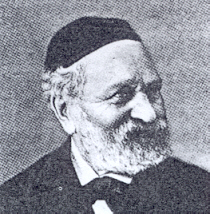Azriel Hildesheimer
Esriel Hildesheimer (also: Azriel or Israel Hildesheimer, born May 20, 1820 Halberstadt, † July 12, 1899 in Berlin) was a German rabbi and is - in addition to SR Hirsch, from which he but despite the common teacher Jacob Ettlinger, in all material different points - the founder of modern orthodoxy.
Through his students, he was far beyond Germany's borders. As Samson Raphael Hirsch, he represented the programmatic principle " talmud torah in derech eretz ", roughly translates to: " Torah study in conjunction with sophistication / practical life ".
Life and work
Hildesheimer studied Talmud and classical languages in Hamburg, Semitic languages at the University of Berlin, history, philosophy and mathematics. In 1842 he continued his studies in Halle ( among others, Wilhelm Gesenius ). There he also received his doctorate. Then he returned to Halberstadt.
In Halberstadt, he married Henrietta Hirsch and thus became financially independent future never demanded compensation for his activities as a rabbi and his other Jewish commitment.
In 1851 he became rabbi of Eisenstadt ( Hungary, now Austria ), where he founded a Jewish school, taught at the Jewish as well as secular knowledge, but was also placed on correct German great value. Soon he also founded a yeshiva, which began in 1851 with six students; 1868 128 students were taught there already.
Although Hildesheimer himself was an Orthodox rabbi, he was met with hostility by most Orthodox rabbis Hungarian because of its non-conformist way. 1868 to 1869 a congress of the Hungarian Jews was held to discuss the establishment of a Hungarian rabbi seminary. Hildesheimer and his followers had to stand up to the reformers and the Orthodox. Probably his compromise proposals would preserve the unity of the Hungarian Jewry, but the Congress ended with a split.
At that time, about 200 families comprehensive Orthodox minority of Jews in Berlin, which was dissatisfied with the commitment of the " reformer " Abraham Geiger, in search of a spiritual leader. The choice fell on Hildesheimer, who took the call and in 1869 joined as a rabbi and chairman of the Beth Midrash to Berlin. There he founded a yeshiva and was the real founder and rabbi of Adass Yisroel community. He now supported by Marcus Mayer Lehmann, editor of the journal " The Israelite " in Mainz, the fight against the reform Judaism.
In 1873 he established an Orthodox rabbinical seminary in Berlin, which should be the most important training center for rabbis from across Europe. Hildesheimer's students received the Samson Raphael Hirsch based on idea conveyed orthodoxy is compatible with the scientific study of Jewish sources. Hildesheimer advocated a collaboration within the community in order to strengthen the Jewish people as a whole. Together with his colleagues he fought against reform of the German anti-Semitism, but at the same time he rejected the reform movement because it undermined his opinion Judaism.
In personal appearance Hildesheimer is described as modest, but simultaneously determined and fearless, industrious, hardworking, compassionate and generous to the poor and active for the beleaguered Jewish communities around the world, for which he asked all means.
He devoted himself to the victims of Russian pogroms and advocated their settlement in Eretz Israel rather than a flight to America. His life was Hildesheimer an avid supporter of the Jews of Palestine and the structure of the Yishuv.
In 1870, he exclaimed in Berlin, the Jewish Press in life, which was the only newspaper which occurred at the time of the emigration of German Jews to Palestine. In 1872 he founded the Palestine Club to raise the educational and professional level of the Jews in Jerusalem. 1879 an orphanage was founded; This drew him to the opposition of the ultra-Orthodoxy of the Old Yishuv, presented the Hildesheimer under a spell.
He supported the Hovevei - Tzijon movement and the settlement of Eretz Israel. For formal legal reasons, the land that had been bought for the construction of Gederah was added to his name.
His contributions to Jewish scholarship were significant: he gave the Halachot Gedolot out a manuscript from the Vatican, which represented a hitherto unknown gaonäisches work.
His dream is to publish a translation of the Torah, remained unfulfilled. He died in 1899 in Berlin.
Hildesheimer's successor at the Berlin Rabbinical Seminary was his student David Hoffmann ( 1843-1921 ).
Works
- Collected Essays. Edited by Meier Hildesheimer. Hermon A.-G., Frankfurt am Main, 1923.
Letters
- Esriel Hildesheimer: letters. Selected and edited by Mordechai Eliav, Mass., Jerusalem 1965 ( in Hebrew).










